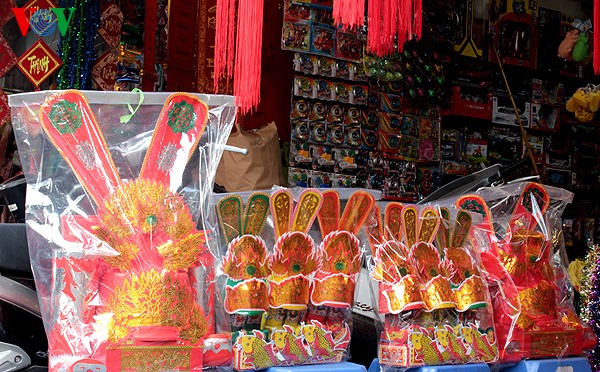(VOVworld) - The 23rd day of the last month of every lunar year is when the Kitchen Gods or Kitchen Kings go back to Heaven to report to the Jade Emperor what happened on earth during the year. On this day, Vietnamese people prepare a feast to worship their ancestors and teach their offspring to do good deeds.
 |
| Indispensable votive offerings to the Kitchen Gods |
Indispensable offerings are votive shoes, clothing, mandarin’s bonnets and carps, which it is believed the Kitchen Gods ride to heaven. People pray for a happy and favorable new year. Tran Thi Ky is from Hanoi’s Long Bien district in Hanoi: “What we offer to the gods depends on our wealth. Our family prepares a tray of food for worshipping, including a big bowl of broth, a bowl of rice, some sticky rice, chicken, fruits, votive money, and 3 costumes for the Kitchen Gods. We burn very little votive money to minimize waste and pollution.”
In Vietnam’s traditional culture, the kitchen plays a very important role and symbolizes coziness and reunion. A “burning fire cooker” is related to a family’s happiness and prosperity. The worshipping of the Kitchen Gods shows people’s gratitude to spiritual forces, who take care of the family for the whole year, and remind family members of their responsibility to their cozy nest. Nguyen Thi Thang of Hoan Kiem district, Hanoi, says the day promotes family bonds: “Our predecessors say that on the 23rd day of the last lunar month, the Kitchen Gods travel to heaven to report the Jade Emperor on how our family has performed over the year. This is an occasion for family reunion and we ask the younger generations to behave properly for good luck.”
|
|
| A shop in Hanoi's Hang Ma street
|
Hang Ma Street in Hanoi sells a lot of votive items. Bui Bich Thuy has bought some essential items there: “The market for votive money is abundant and we have many choices. But I only buy essential things: mandarin’s bonnets. Our sincerity to the gods is more important than the money we spend on offerings. We cook a feast to follow tradition.”
According to Do Lan Phuong of the Center for the Study of Culture and Development, people’s more elaborate offerings show their respect for national tradition. But she warns of possible waste: “The worshiping of the Kitchen Gods doesn’t depend on the offerings, but the sincerity of the worshipers. Many sumptuous rituals are unnecessary because the rituals bear symbolic meanings. It’s more important that we are aware of the spiritual meanings when we perform these rituals.”